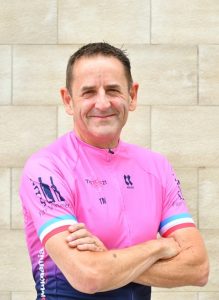
Former Bone Marrow Transplant patient Nick Topley is preparing to take on Cure Leukaemia’s London 2 Paris this week.
Nick will be lining up alongside Professor Jim Murray from our Cardiff TAP Centre who were responsible for his successful transplant over ten years ago.
Nick was first diagnosed with autoimmune hepatitis, which, of all the things that were still to come, Topley describes as the worst.
“It was probably the only time I really ever thought about the fact that I might die because I was so ill. It was just awful,” he says.
Following treatment he went into remission for a number of years. Ironically, it was only as he was being officially discharged from the liver clinic that Topley – who worked in senior leadership at Cardiff’s Heath Hospital, where he had also been treated – glanced at his notes and realised that something was still very wrong. His haemoglobin count was around half of what it should have been.
“That was the beginning of my bone marrow failure,” he says. “Within three months, I was requiring blood transfusions because my bone marrow function was falling out so rapidly.”
He was diagnosed with aplastic anaemia, a condition that means the body does not produce sufficient red blood cells. Like Topley’s hepatitis, it is an autoimmune disease, and it eventually transpired the two were connected.

His treatment consisted of having T-cells removed to dampen his immune system, and it worked – he was in remission for two-and-a-half years, before symptoms began to return while on a holiday in Greece. Again, within weeks he was dependent on transfusions. This time, Topley’s condition had progressed to severe aplastic anaemia, and he ended up having a bone marrow transplant, the donor being his sister.
After that, he spent six weeks in isolation. “It was 40 days and 40 nights,” he says. “The worst thing was the food. You’re in this twilight zone,” he adds.
“You’re a bit out of it because you’ve had chemotherapy and you’re on lots of drugs, and you’re just waiting for your numbers to change.” Topley’s numbers did eventually change, and he was able to go home to continue his recovery.
It was here that he discovered his love of cycling. As part of his recovery post transplant, he rapidly became hooked. With competitive sport having a huge effect on his life, keeping fit has always been important to Nick.
“Cycling was particularly so as a side effect of treatment causes damage to the pelvis and hip joint. Cycling is a really good exercise for this. It started with 3km and soon became competitive and eventually sportifs and triathlon.”
Nick’s love of competitive sport led to him competing in the Transplant Games.
“I first competed in Newport in 2019 and won a silver medal (against expectation) and then won a gold and bronze in Leeds in 2022. I didn’t realise how competitive it would be especially in the 50-60 and 60-70 category. Following this, I qualified for Team GB&NI Team for the World Transplant Games in Perth in April 2023.”
“It was a fabulous experience with >5000 transplant patients competing. We won gold in the Team Time Trial and I won bronze medals in the TT and Road Race. It was an incredible feeling of togetherness and camaraderie among athletes.”






